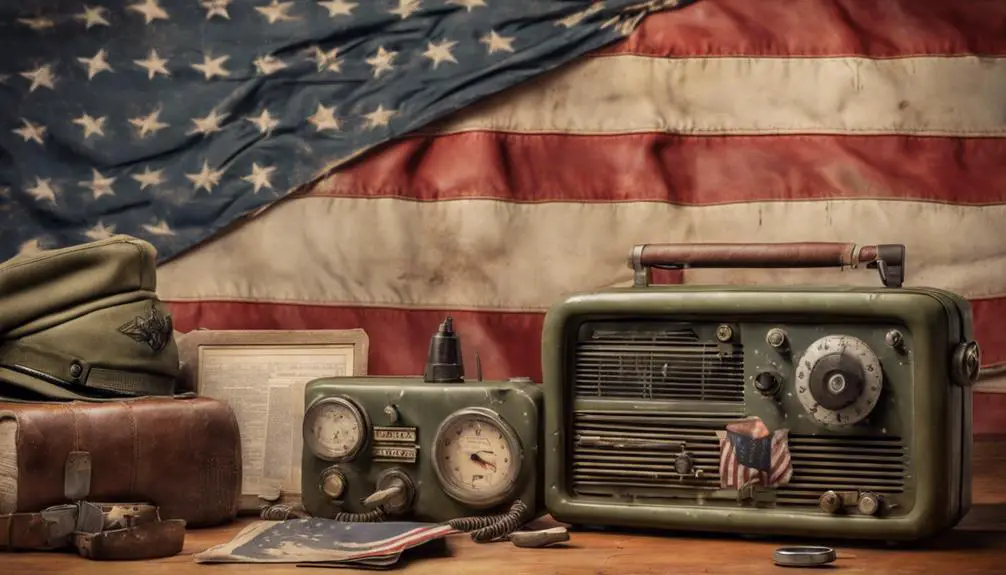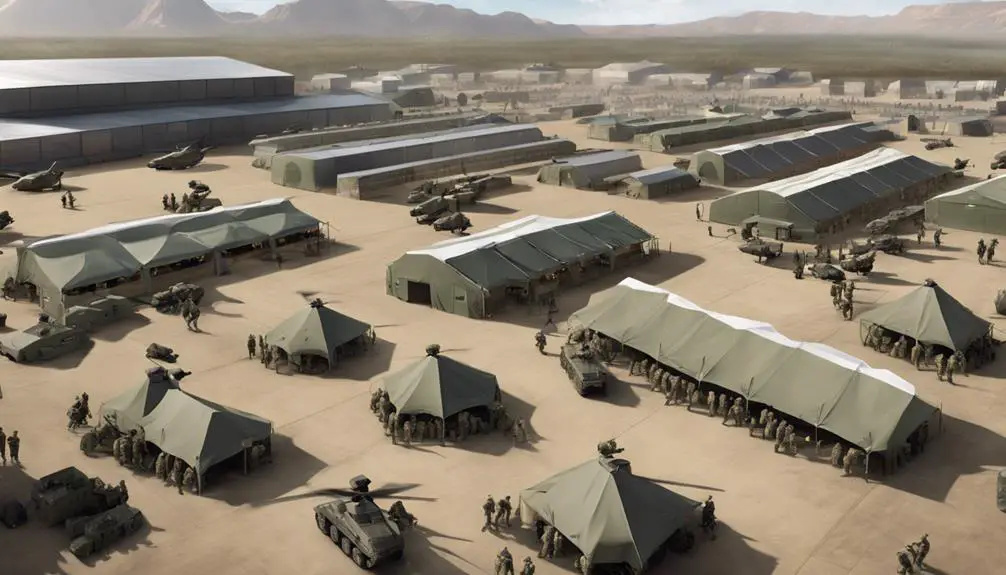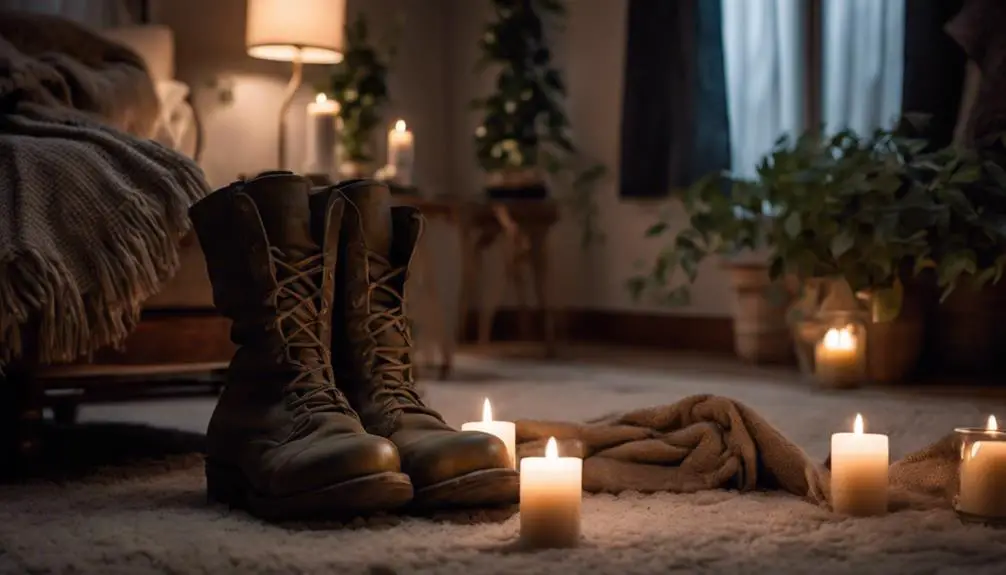In military jargon, your "home base" is more than just a physical location – it's a symbol of security, comfort, and a domestic haven. Originally coined in World War II, it referred to a main military installation where you could rest and recharge. Today, it's a critical component of military strategy, serving as an operational hub for troops, where you can refocus and rejuvenate. Whether it's a forward-operating base or patrol base, your home base is where you feel at ease, surrounded by camaraderie and shared values. And there's more to unravel about the significance of home base – exploring its evolution, comforts, and psychology can reveal a deeper understanding of what it truly means.
Origins in World War II

As you explore the history of military slang, you'll find that the term 'home base' originated during World War II, when soldiers used it to refer to their main military installation or headquarters. This term emerged as a result of the massive military mobilization efforts during the war. As the war efforts escalated, soldiers needed a way to quickly communicate and identify their main bases of operation. The term 'home base' became a important reference point to refer to these central locations.
During World War II, the Allies' military mobilization involved massive troop deployments, equipment transportation, and supply chain management. In this situation, 'home base' served as a vital reference point for soldiers, allowing them to coordinate their efforts and maintain a sense of familiarity amidst the chaos of war. As the war dragged on, the term stuck, becoming an integral part of military slang. Today, 'home base' remains a widely recognized term, symbolizing a sense of comfort, security, and familiarity – a proof to the resourcefulness and adaptability of soldiers during World War II.
Evolution of Home Base Terminology

You'll notice that the term 'home base' has undergone significant changes in meaning and usage since its inception during World War II. Initially, it referred to a military base where personnel could rest and recharge. Over time, the term evolved to encompass not only the physical base but also the sense of security and comfort it provided.
As military operations expanded, so did the concept of home base. It began to symbolize a domestic haven, a place where soldiers could find solace and respite from the chaos of war. Base operations, once solely focused on military strategy, now prioritized the well-being of personnel. The term 'home base' became synonymous with a sense of belonging and comfort, a place where soldiers could recharge and refocus.
Today, the term 'home base' is an integral part of military slang, conveying a sense of security, comfort, and familiarity. It's a reminder that, no matter where duty takes them, soldiers can always find a sense of home, even in the midst of conflict.
Military Bases as Home Away

When you're deployed in a foreign land, your military base becomes a home away from home, where you can find a sense of normalcy amidst the uncertainty of war. The base becomes a microcosm of family dynamics, where camaraderie and trust are forged among fellow service members. You develop a sense of belonging, and the base becomes an extension of your own identity.
As you settle into your new environment, you begin to feel a sense of ownership and responsibility towards the base. You take pride in your role, whether it's maintaining equipment, providing medical care, or conducting operations. The base becomes a reflection of your own identity, and you work together with your fellow service members to maintain a sense of community and normalcy.
Your base identity is shaped by the shared experiences, traditions, and values of your unit. You develop a strong bond with your fellow service members, and the base becomes a symbol of comfort and security in an unfamiliar environment. As you navigate the challenges of deployment, your military base becomes a true home away from home.
Home Base in Modern Warfare

In modern warfare, your home base is often a forward-operating base (FOB) or a patrol base, strategically located to support tactical operations in remote or hostile areas. These bases serve as hubs for Base Operations, providing logistical support, maintenance, and supply chain management. As a tactical hub, your home base is equipped to guarantee rapid response and adaptability, allowing you to respond swiftly to emerging threats or opportunities.
As the Tactical Headquarters, your home base is responsible for planning, coordinating, and executing operations. It's where you'll find critical assets, such as intelligence, communications, and medical facilities. The base's layout and security are designed to secure the safety of personnel and equipment, while also providing a platform for launching and sustaining operations.
In this environment, you'll work closely with other units and teams, sharing intelligence and coordinating efforts to achieve strategic objectives. Your home base is more than just a physical location – it's a nerve center for military operations, where you'll plan, execute, and adapt to the ever-changing landscape of modern warfare.
The Comforts of Home Base Life

After long periods of intense operational tempo, the comforts of home base life can be a welcome respite, offering a sense of normalcy and familiarity that's hard to come by in the field. You're finally back in a place where you can relax, recharge, and reconnect with loved ones. Home base life allows you to re-engage with family dynamics, which may have taken a backseat during deployments. You get to re-establish cozy routines, like having dinner with your family, watching your kids' sports games, or simply enjoying a quiet evening at home. These small pleasures become significant comforts after months of uncertainty and chaos. You can finally take a deep breath, let your guard down, and be yourself. Home base life is a chance to regain a sense of balance, recalibrate, and rejuvenate before the next deployment. It's a time to focus on your personal life, nurture relationships, and rebuild your sense of self.
Home Base as a State of Mind

How do you define home base, and is it a physical place or a state of mind where you feel most grounded and at ease? For some, home base is a tangible location, like a childhood home or a cozy apartment. But for others, it's a mental sanctuary, a safe haven where they can retreat from the world's chaos. This emotional refuge is a state of mind, a feeling of comfort and security that transcends physical boundaries. When you're in this mental home base, you feel protected, supported, and at peace. You can access this state of mind whenever, wherever, allowing you to cope with life's challenges more effectively. By recognizing home base as a state of mind, you can cultivate a sense of calm and clarity, even in the most turbulent times. This mindset becomes your emotional anchor, providing a sense of stability and balance in an ever-changing world.
The Psychology of Home Base

Digging deeper into the psychology of home base reveals that it's closely tied to your sense of identity and self-perception. You see, home base is more than just a physical place; it's an emotional refuge that provides a sense of belonging and comfort. This sense of belonging is deeply rooted in your psyche, making you feel secure and grounded. When you're away from home base, you may feel adrift, struggling to find your bearings. But when you return, you're enveloped in a sense of familiarity and comfort, which rejuvenates your spirit and revitalizes your sense of self.
Your home base is a reflection of your values, personality, and experiences. It's a space where you can be yourself, without fear of judgment or rejection. This emotional connection is what makes home base so essential to your well-being. It's where you recharge, reflect, and rejuvenate, preparing yourself to face the challenges of the outside world. By understanding the psychology of home base, you'll gain insight into what drives your sense of belonging and how to cultivate a deeper connection with your emotional refuge.
Home Base in Military Jargon

As you explore the world of military slang, you'll discover that 'home base' takes on a distinct meaning, referring to a soldier's base of operations or a safe haven during deployments. In this scenario, home base serves as an operational hub, where troops can regroup, refuel, and recharge. It's a place where soldiers can find respite from the chaos of combat, a family sanctuary that provides a sense of comfort and security.
In military jargon, home base is often used interchangeably with terms like 'forward operating base' or 'firebase.' It's a critical component of military strategy, providing a secure location for troops to plan, prepare, and execute missions. A well-established home base can mean the difference between success and failure, as it enables soldiers to respond quickly to emerging threats and adapt to changing circumstances.
As you immerse yourself further into military culture, you'll find that the concept of home base is woven into the fabric of military life, representing a sense of belonging, camaraderie, and shared purpose.
Home Base Beyond the Military

Essentially, your home base in the civilian world may not involve combat operations, but it still serves as a sanctuary, providing a sense of comfort, security, and familiarity. Whether it's a cozy apartment, a spacious house, or a quaint cottage, your home base is where you feel at ease, relaxed, and rejuvenated. Fundamentally, it's your home away from home, a place where you can be yourself without fear of judgment or reprisal.
Beyond the military, your home base becomes a domestic haven, a place to retreat from the stresses of daily life. It's where you can unwind, recharge, and reconnect with loved ones. For many, it's a symbol of stability, security, and comfort, providing a sense of belonging and identity. Your home base is where you can let your guard down, be vulnerable, and simply be yourself. It's a place to create memories, share laughter, and forge lasting bonds with family and friends. In the civilian world, your home base is more than just a physical space – it's a sanctuary that nurtures your mind, body, and soul.
Frequently Asked Questions
Can Civilians Use "Home Base" in a Non-Military Context?
You can definitely use "home base" in a non-military context. In fact, you might already be doing so in your daily conversations. When you refer to your home base, you're talking about your personal sanctuary, where you feel most comfortable and at ease. It's the place you return to after a long day, surrounded by loved ones in your social circles. Use it freely to describe your cozy abode, and others will understand exactly what you mean.
Is "Home Base" Exclusive to the US Military?
You're wondering if "home base" is exclusive to the US military. Not quite. Although the term has military origins, it's not unique to the US. International equivalents exist, such as Canada's "main operating base" and the UK's "main base". These terms serve the same purpose, referring to a central location for operations or deployments.
Can "Home Base" Refer to a Specific Building or Facility?
Did you know that 75% of people consider their home a sanctuary? Speaking of bases, can "home base" refer to a specific building or facility? Absolutely. In a military context, home base can be a military headquarters or an operational hub, like a command center or a logistics depot. It's a central location where critical operations are coordinated and resources are allocated. Think of it as the nerve center of military operations.
Is "Home Base" Used in Other Languages or Cultures?
You might wonder if the concept of a "home base" has cultural equivalents or linguistic variations in other languages or cultures. Indeed, it does. In many cultures, there's a concept of a central gathering place or hub that serves as a comfort zone. In Japanese, it's "jiban" (local base), while in French, it's "base arrière" (rear base). These terms evoke a sense of safety, comfort, and familiarity, transcending linguistic and cultural boundaries.
Can "Home Base" Be Used in a Non-Military Figurative Sense?
You might think "home base" is just a military term, but it's more versatile than that. In a non-military sense, "home base" can represent your personal sanctuary, where you feel safe and relaxed. It's your comfort zone, where you recharge and refocus. You can apply this concept to your daily life, making your home, a favorite coffee shop, or a serene outdoor spot your "home base" – a place that provides solace and rejuvenation.







